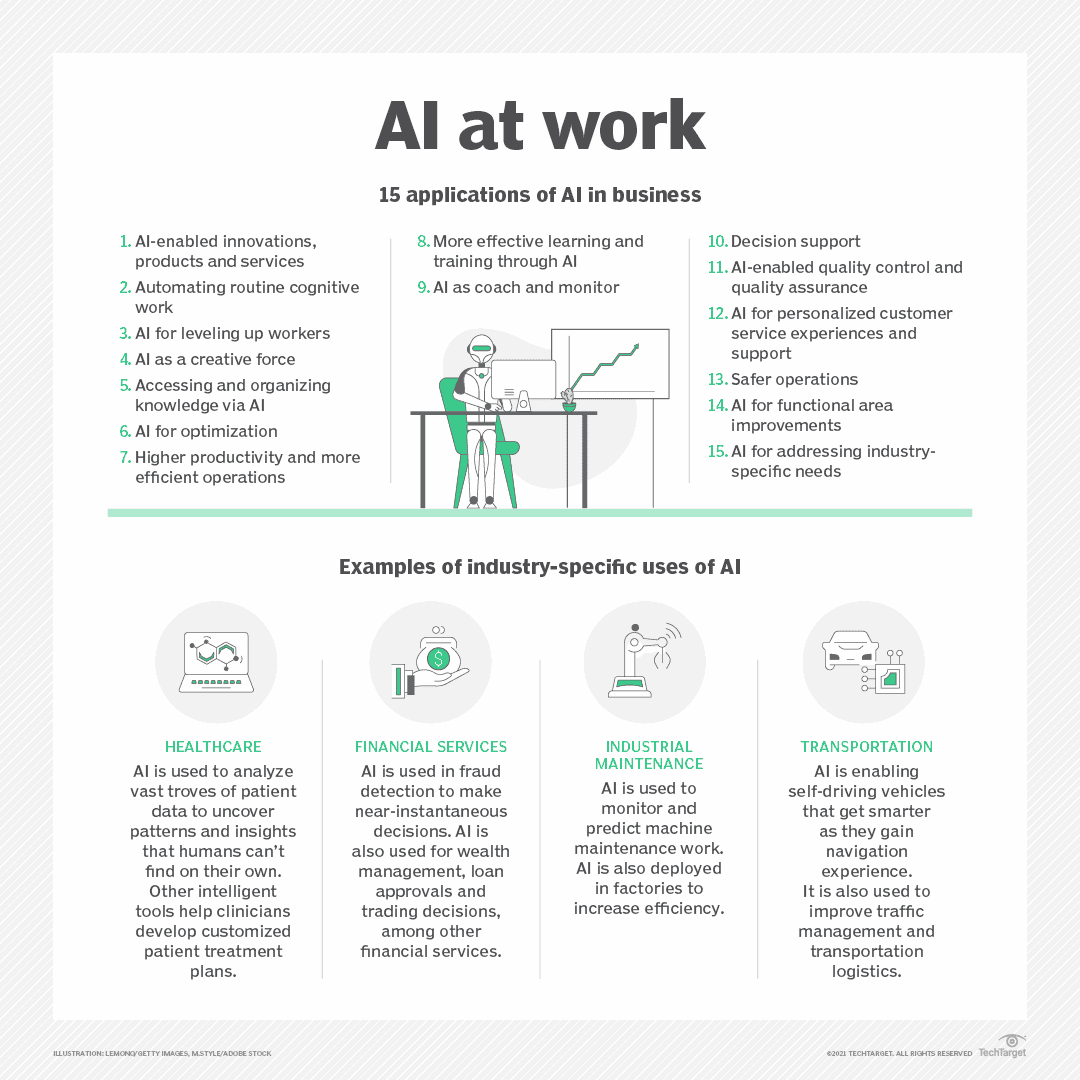AI is everywhere in business, helping with tasks and speeding up work. Firms use it alone or combine it with their software to make things faster.
AI applications in business
New surveys reveal that businesses are testing AI more and more. A pulse survey of 254 tech leaders, conducted by professional services firm EY in April 2023, revealed a curious trend. Big 90% checking AI stuff like ChatGPT and Bing Chat. They like AI lots. And 80% will spend more on AI next year.
Leaders in many industries like AI. They say it makes work better and cheaper. It helps them compete and change as markets do. They also like that AI tools are easier to get now.

In business, AI is used for security, automating tasks, and helping customers. People talk to computers using language (NLP). But AI doesn’t stop there. It’s in everything companies do. Here are 15 big examples.
AI-enabled innovations and products
Companies are harnessing the promise of AI to drive innovation and develop new goods and services. AI can be used to improve telecommunications platforms, enhance voice and image quality, and maintain image integrity during virtual interactions, among other things.
Automating smart tasks
AI is now being used to automate cognitive activities, such as summarizing reports and composing communications. This move increases productivity, but also raises concerns about the impact on established job roles.
AI for skill enhancement
Even where jobs cannot be fully automated, AI can help people by providing advice and guidance. This enables employees to improve their performance, whether through better writing, software development or strategic planning.
AI as a creative force
AI can make art, music, poetry, writing, and code. Even though there are worries about it being truly original, businesses are actively using AI to generate various kinds of content.
Knowledge access and organization
AI, especially generative AI, assists workers in handling and arranging large data sets, making them easier to handle. But human supervision is crucial because AI can make mistakes and assumptions at times.
AI for optimization
By mining data and finding bottlenecks, AI-driven algorithms and models optimize numerous business activities, from labor scheduling to product pricing.
Better work and speed
AI is used to increase productivity and operational efficiency across multiple processes, surpassing human capabilities in speed and accuracy.
Better education and training
Smart tools change training to fit each person’s needs and what they already know. This makes training better.
AI as a coach and monitor
As seen in the logistics and transportation industries, AI-powered solutions monitor and coach employees in real time, driving improved performance and compliance.
Decision Support
Smart decision help systems make decisions better by giving data-backed advice to experts in fields like medicine, accounting, and research.
Quality control and assurance
Manufacturers are using AI, such as machine vision and deep learning, to improve quality control and ensure that goods meet strict specifications.
Customized service
While there is room for improvement, AI offers tailored customer experiences by integrating customer data and personalizing interactions based on preferences and behavior.
Enhanced Safety
AI improves safety in various industries by using data from cameras and sensors to spot dangers, prevent accidents, and follow rules. AI helps with many business tasks, including customer service, marketing, supply chain management, HR, cybersecurity, IT, and risk management.
In healthcare, AI aids in diagnosing and planning treatments. It detects fraud in financial services and predicts maintenance needs in industry. It manages traffic and enables self-driving cars in transportation. These uses of AI in different fields show how it can change and improve business processes in today’s digital age.
How Businesses Are Using AI
Forbes has conducted a survey that showed interesting results concerning how businesses are increasingly turning to AI to improve their operations and enhance customer experiences.

Firms use AI in many parts of their work. It’s common in customer help (56%), security and fraud control (51%), handling customer ties (46%), digital helper tools (47%), supply management (40%), making stuff (35%), suggesting goods (33%), money math (30%), supply chains (30%), hiring talent (26%), and finding buyers (24%). AI is getting vital in making these jobs easier, better, and improving how customers feel in lots of trades.
Make customers happier
73% of businesses chat with AI-powered chatbots for instant messages. 61% use AI to make emails better. 55% use AI to suggest things customers might like. AI also helps make website words (42%) and ads (46%). Also, AI answers phones (36%) and makes texts better (49%).

AI improves business processes
AI is helping make manufacturing better (53%). Process automation is used by 51% of organizations. In 52% of cases, AI helps with search engine stuff like finding good keywords. Other things AI does include collecting data (40%), thinking up ideas (38%), and making things safer (38%). AI makes it easier to talk inside a company and make plans and reports (46%). Some use AI to write computer code (31%), and others use it to write stuff for websites (29%).

Optimistic AI outlooks
Most business owners think AI will help them. They expect better customer service, more work done, increased sales, faster decisions, quicker responses, and lower costs.

Concerns about AI in Business
Lots worry about AI, like how it affects web traffic (24%). People also fear relying too much on AI (43%), needing tech skills (35%), AI mistakes (28%), job cuts (33%), and wrong info (30%). Privacy and data safety worries (31%) add to AI concerns.

ChatGPT has a bright future
Almost all business owners (97%) believe that ChatGPT will benefit their business. Expected benefits include responding to chatbots (74%), improving email communication (46%), eliminating code errors (41%), interpreting information (47%) and summarising information (53%).

Companies hope ChatGPT makes decisions better, boosts trust, brings more web visitors, and makes hiring easier.
Wrap up
To sum it up, companies are quickly bringing AI into their work. They have good and bad thoughts about it. In the future, AI, like ChatGPT, will change how businesses talk to customers, handle work, and decide things.





